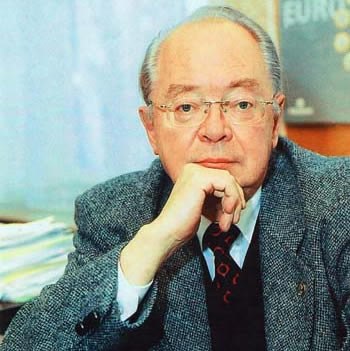When it comes to expertise on Afghanistan, not many look east. Those who did will have discovered Russian Viktor Korgun who, as we were sad to learn today, has passed away in Moscow. He was also respected in Afghanistan as shown by the invitation – as one of only few foreign experts – to a scientific conference organized by the Afghan foreign ministry and the Mahmud Tarzi Foundation in Kabul in 2008. AAN joins in with those mourning the death of this passionate 'Afghanist', together with the guest author of our obituary, Ekaterina Stepanova.(*)
On 4 January 2014, one of Russia’s best and longest-standing experts on Afghanistan, Dr Viktor Grigorievich Korgun, died in Moscow at the age of 74, as a result of a long disease.
Viktor Korgun is the first scholar who comes to mind of anyone remotely familiar with Russian Afghanistan studies, especially with regard to post-Soviet expertise on Afghanistan. He was a source of great inspiration to many of his colleagues and had friends of all ages. This was only natural for someone who, in his early 70s, was still young at heart and professionally more active than many colleagues young enough to be his grandchildren.
In his latest capacity, he directed the Afghanistan Studies unit at the Institute of Oriental Studies of the Russian Academy of Sciences where he had received his PhD degree in Afghan studies almost 40 years ago. Since the late 1960s until his last days, he also lectured extensively at universities both in Russia and abroad, ranging from the Institute of Asian and African countries and the Military University in Moscow to the University of Omaha in Nebraska. Born in Leningrad in 1940, he graduated from the Soviet Cadet School in 1957 and got his university diploma from the Moscow State University’s Institute of Oriental Languages in 1968. Fluent in Dari and English, he was a frequent visitor to Afghanistan since 1966, starting as an interpreter at the Soviet Embassy in Kabul and the Afghan ministry of planning in the late 1960s, to become a research secretary of the Soviet-Afghan Commission of Historians in the 1980s. He continued to visit throughout the post-Soviet years – which has not been very typical for the Russian observers of Afghanistan. He was also a keen observer of the countries in the broader region, including Iran and Central Asia.
Viktor Korgun critically studied – and took to heart – the mistakes and failures of the Soviet Afghanistan policy. He managed to survive and to work through the relative loss of interest in and the erosion of expertise on Afghanistan in Russia in the 1990s. He had of course amassed an intimate knowledge of the country, its regions and communities, its power plays and political economy, its social life and history – but he did not simply study Afghanistan. He also loved the country and respected its people, cultures and traditions. He was remarkably pragmatic and resilient, but also a warm person – much like most Afghans are themselves. His death is an immense loss to the Russian and wider international community, not only of Afghan experts but of all analysts and practitioners interested in the history, politics, economics and issues of conflict, peace and security in the broader region.
——
Among Viktor Korgun’s work are the following books (in Russian):
1. Rossia i Afganistan: Istoricheskie puti formirovanie obraza Rossii v Afghanistane (Russia and Afghanistan: Historical ways of the formation of Afghanistan's views on Russia), Moscow 2009
2. Afganistan v nachale XXI veka (Afghanistan at the Beginning of the 21st Century), Moscow 2004
3. Istoriya Afganistana: XX vek (History of Afghanistan: The 20th Century), Moscow 2004
4. Afghanistan: Politika i politiki (Afghanistan: Politics and Politicians), 1999
5. Intelligentsia v politicheskoj zhizni Afganistan (The Role of the Intelligentsia in Afghanistan’s Political Life), Moscow 1983.
——
Read an obituary by Dr Korgun's colleagues here (in Russian).
This article is also available on the Afghanistan Analysts Network (AAN)











